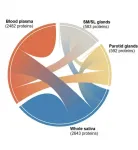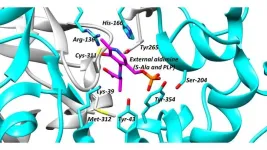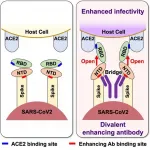Study reveals new details on what happened in the first microsecond of Big Bang
Researchers from University of Copenhagen have investigated what happened to a specific kind of plasma - the first matter ever to be present - during the first microsecond of Big Bang.
2021-05-25
(Press-News.org) About 14 billion years ago, our universe changed from being a lot hotter and denser to expanding radically - a process that scientists have named 'The Big Bang'.
And even though we know that this fast expansion created particles, atoms, stars, galaxies and life as we know it today, the details of how it all happened are still unknown.
Now a new study performed by researchers from University of Copenhagen reveals insights on how it all began.
"We have studied a substance called Quark-Gluon Plasma that was the only matter, which existed during the first microsecond of Big Bang. Our results tell us a unique story of how the plasma evolved in the early stage of the universe," explains You Zhou, Associate Professor at the Niels Bohr Institute, University of Copenhagen.
"First the plasma that consisted of quarks and gluons was separated by the hot expansion of the universe. Then the pieces of quark reformed into so-called hadrons. A hadron with three quarks makes a proton, which is part of atomic cores. These cores are the building blocks that constitutes earth, ourselves and the universe that surrounds us," he adds.
From fluent and smooth to the strong building blocks of life
The Quark-Gluon Plasma (QGP) was present in the first 0.000001 second of Big Bang and thereafter it disappeared because of the expansion.
But by using the Large Hadron Collider at CERN, researchers were able to recreate this first matter in history and trace back what happened to it.
"The collider smashes together ions from the plasma with great velocity - almost like the speed of light. This makes us able to see how the QGP evolved from being its own matter to the cores in atoms and the building blocks of life," says You Zhou.
"In addition to using the Large Hadron Collider, the researches also developed an algorithm that is able to analyze the collective expansion of more produced particles at once, than ever possible before. Their results show that the QGP used to be a fluent liquid form and that it distinguishes itself from other matters by constantly changing its shape over time.
"For a long time researchers thought that the plasma was a form of gas, but our analysis confirm the latest milestone measurement, where the Hadron Collider showed that QGP was fluent and had a smooth soft texture like water. The new details we provide is that the plasma has changed its shape over time, which is quite surprising and different from any other matter we know and what we would have expected," says You Zhou.
One step closer to the truth about Big Bang
Even though this might seem like a small detail, it brings us one step closer to solving the puzzle of the Big Bang and how the universe developed in the first microsecond, he elaborates.
"Every discovery is a brick that improves our chances of finding out the truth about Big Bang. It has taken us about 20 years to find out that the Quark-Gluon Plasma was fluent before it changed into hadrons and the building blocks of life. Therefore our new knowledge on the ever changing behavior of the plasma, is a major breakthrough for us," You Zhou concludes.
The study has just been published in the journal Physics Letters B and is performed by You Zhou together with Zuzana Moravcova, who is a PhD at the Niels Bohr Institute at University of Copenhagen.
INFORMATION:
ELSE PRESS RELEASES FROM THIS DATE:
2021-05-25
A rare mutation that causes Parkinson's disease-like symptoms interrupts the flow of dopamine in the brain, suggests a study in fruit flies published today in eLife.
The findings provide more detailed insights about why young children with this mutation develop these symptoms. This new information, as well as previous evidence that therapies helping to improve dopamine balance in the brain can alleviate some symptoms in the flies, suggests that this could be a beneficial new treatment strategy.
Parkinson's disease causes progressive degeneration of the brain that leads to impaired movement and coordination. Current treatments focus on replacing or increasing the levels of dopamine to help reduce movement-related symptoms. But these drugs can have side ...
2021-05-25
Graphene nanoribbons (GNRs), narrow strips of single-layer graphene, have interesting physical, electrical, thermal, and optical properties because of the interplay between their crystal and electronic structures. These novel characteristics have pushed them to the forefront in the search for ways to advance next-generation nanotechnologies.
While bottom-up fabrication techniques now allow the synthesis of a broad range of graphene nanoribbons that feature well-defined edge geometries, widths, and heteroatom incorporations, the question of whether or not structural disorder is present in these atomically precise GNRs, and to what extent, is still subject to debate. The answer to this ...
2021-05-25
In the latest National Autism Indicators Report, researchers from Drexel University’s A.J. Drexel Autism Institute examined surveys of family members of autistic adults who use Developmental Disability services, and found needs for additional supports like respite care and assistance to plan for crisis and emergencies, especially among families whose adult lived with them.
Data from the surveys showed over one quarter of families with autistic adults who use Developmental Disability services and live with family do not have enough services or supports for themselves, according to the report. And over half of these families ...
2021-05-25
Staying up all night, working nonstop, eating on the run and skipping meals are often telltale signs of starting a new business. But research shows this constant hustle - which is often glorified as the key to success - can have a negative impact not only on an entrepreneur's health and well-being but also his or her business.
New research led by UCF assistant professor of management Jeff Gish suggests that engaging in recovery may help entrepreneurs reduce the negative impact of stress.
"Entrepreneurs who work really hard and grind on their business and who most ...
2021-05-25
Cells sense and respond to the mechanical properties of the cellular microenvironment in the body. Changes in these properties, which occur in a number of human pathologies, including cancer, can elicit abnormal responses from cells. How the cells adapt to such changes in the mechanical microenvironment is not well understood.
A team of researchers at Texas A&M University are working to understand cellular mechanosensing -- the ability to sense and respond to the mechanical properties of the microenvironment -- in a unique way. Dr. Tanmay Lele, Unocal Professor in the Department of Biomedical Engineering, Department of Chemical Engineering and the Department of Translational Medical Sciences, partnered with Dr. Charles Baer, an evolutionary biologist at the University of Florida. ...
2021-05-25
BUFFALO, N.Y. - To improve the development of new saliva-based diagnostic tests and personalized medicine, the National Institute of Dental and Craniofacial Research (NIDCR) has supported the development of the Human Salivary Proteome Wiki, the first public platform that catalogs and curates data on each of the thousands of proteins within our saliva.
Detailed in an article published on Tuesday, May 25 in the Journal of Dental Research, the wiki provides researchers and clinicians with rich, unbiased evidence from multiple independent studies to help explore the dynamic and complex nature of saliva, as well as analytical tools to search for data by tissue type, disease and more.
"This ...
2021-05-25
New effective compounds, which can be endogenous donors of a signaling molecule - hydrogen sulfide in the body, were synthesized by SUSU scientists. Due to this property, the obtained compounds are potential drugs with a cancer-preventing effect. The research work was published in the Russian Chemical Bulletin (Q3).
Organosulfur compounds with anticancer, antibacterial, and antirheumatic properties have been studied for some years by scientists from South Ural State University and N.D. Zelinsky Institute of Organic Chemistry, Russian Academy of Sciences. In the latest study, they attempted to search for new derivatives of 1,2-dithiol-3-thiones - compounds with various ...
2021-05-25
Scientists from the UK's University of Bath explore racemases - an important type of enzyme that is linked to certain cancers and other life-threatening diseases while also being critical to cell function - in a paper published in the prestigious journal Chemical Society Reviews. The scientists also propose new strategies for finding drugs that neutralise these enzymes.
Many racemases and epimerases perform vital roles in human and animal cells, and in disease-causing organisms. They facilitate proper nerve function, the degradation of toxic substances, the formation of bacterial cell walls and the conversion of certain drugs into their active ...
2021-05-25
Alzheimer's disease is the main cause of dementia and current therapeutic strategies cannot prevent, slow down or cure the pathology. The disease is characterized by memory loss, caused by the degeneration and death of neuronal cells in several regions of the brain, including the hippocampus, which is where memories are initially formed. Researchers from the Netherlands Institute for Neuroscience (NIN) have identified a small molecule that can be used to rejuvenate the brain and counteract the memory loss.
New cells in old brains
The presence of adult-born cells in the hippocampus ...
2021-05-25
A research group from Osaka University led by Professor Hisashi Arase and consisting of researchers from the Research Institute for Microbial Diseases, the Institute for Protein Research, the Immunology Frontier Research Center, the Center for Infectious Diseases, and the Graduate School of Medicine has discovered for the first time that both neutralizing antibodies that protect against infection as well as infection-enhancing antibodies that increase infectivity are produced after infection with SARS-CoV-2 by analyzing antibodies derived from COVID-19 patients.
Antibodies against the receptor binding site (RBD) of the SARS-CoV-2 spike protein play an important function as ...
LAST 30 PRESS RELEASES:
[Press-News.org] Study reveals new details on what happened in the first microsecond of Big Bang
Researchers from University of Copenhagen have investigated what happened to a specific kind of plasma - the first matter ever to be present - during the first microsecond of Big Bang.


